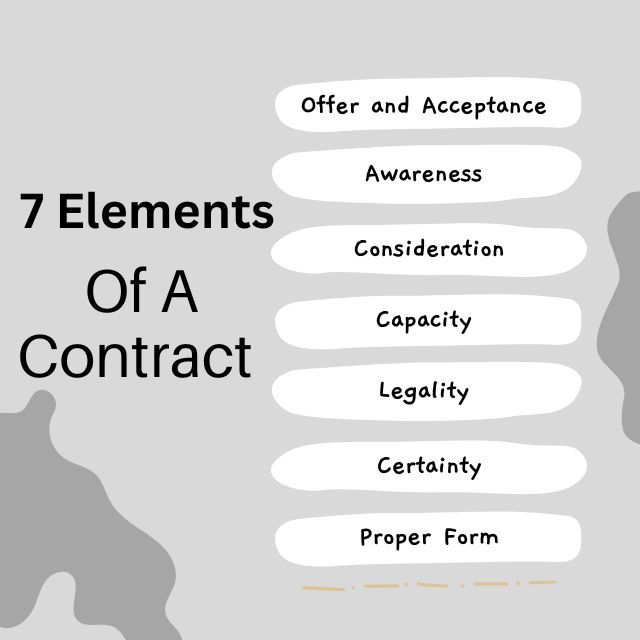Entering into a contract—whether for renting property, freelance work, or purchasing goods—requires a clear understanding of the essential elements of a contract. A contract serves as the official framework for any agreement, and misunderstanding its core requirements can lead to serious legal complications.
Although contracts may seem packed with complex legal jargon, they are fundamentally formal statements of mutual understanding (“The parties agree to these terms”). However, for this agreement to be legally valid and enforceable in court, it must include certain essential elements of a contract. In this guide, we’ll break down the seven key components that make an agreement clear, legally binding, and enforceable.

Understanding these elements of a contract is crucial for businesses and individuals entering into agreements. In this article, we will discuss the seven key elements of a contract that make up a valid contract.
Contracts are the cornerstone of business transactions, offering legal protection and defining the rights and obligations of the parties involved. For a contract to be valid and enforceable, it must meet seven essential elements: offer and acceptance, awareness, consideration, capacity, legality, certainty, and proper form. The offer and acceptance form the agreement, while awareness ensures the intention to create a binding legal relationship. Consideration is the exchange of value between parties, and capacity ensures that all involved are of legal age, mentally competent, and not coerced. Legality confirms the contract’s purpose complies with the law, and certainty provides clarity in terms to avoid ambiguity. Proper form ensures the contract adheres to required written standards where applicable. These elements safeguard the enforceability of contracts, reducing disputes and fostering strong business relationships. By incorporating these essential components, businesses can secure legally sound and mutually beneficial agreements.
Also Read: What is CLM
Offer and Acceptance
The first element of a valid contract is an offer and acceptance. An offer is a clear expression of willingness by one party to enter into a contract under certain terms and conditions. It must be communicated to the other party or parties, creating an opportunity to accept the offer. Acceptance occurs when the other party agrees to the terms of the offer without any modifications. Both the offer and acceptance must be voluntary and unequivocal, forming one of the essential elements of a contract.
Also Read: Signature guarantee vs notary
Awareness
For a contract to be valid, there must be an intention by the parties involved to create a legal relationship. This means that they must have a genuine intention to be bound by the terms of the contract and accept the legal consequences that may arise from it. Agreements that are purely social or domestic in nature, where the parties do not intend to create legal relations, generally do not qualify as valid contracts. This intention is one of the critical elements of a contract.

Try Contract Generator
Speed Up Your Workflow: Create Contracts in Under 60 Seconds
Get Started FreeAlso Read: What can contract management software ensure
Contractual Consideration
Consideration refers to something of value that is exchanged between the parties. It can be in the form of money, goods, services, or promises to do or refrain from doing something. Consideration is essential because it demonstrates that each party has given something in return for the promises made by the other party. Without consideration, a contract lacks the necessary mutuality and may be deemed unenforceable, making it one of the vital elements of a contract.
Also Read: Contract administration vs contract management
Contractual Capacity
To be valid, all parties involved in a contract must have the legal capacity to enter into the agreement. This means that they must be of legal age, mentally competent, and not under the influence of duress, coercion, or undue influence. Individuals who lack capacity, such as minors or individuals with mental incapacities, may have their contracts voidable or unenforceable. Capacity is one of the indispensable elements of a contract.
Also Read: Can I notarize for a family member in NY
Contract Legality
A valid contract must have a lawful purpose and cannot involve any illegal activities or go against public policy. If a contract involves illegal actions or goes against public policy, it is considered void and unenforceable. It is essential for parties to ensure that their agreements comply with the applicable laws and regulations of the jurisdiction in which the contract is being formed.
Also Read: Contract lifecycle management blockchain
Certainty
Certainty refers to the clarity and specificity of the terms and conditions in a contract. The terms must be sufficiently clear and definite to enable a court to enforce them if necessary. Ambiguous or vague terms can lead to misunderstandings and disputes. The contract clauses should clearly outline the rights and obligations of each party, including details such as the scope of work, payment terms, delivery timelines, and any other essential terms relevant to the agreement.
Also Read: Adding an addendum to a contract
Proper Form
The final essential element of a valid contract is the proper form. While contracts can be oral or written, certain types of contracts must be in writing to be enforceable. These include contracts involving the sale of land, agreements that cannot be performed within one year, and contracts for the sale of goods over a certain value, as mandated by the Statute of Frauds. Additionally, it is generally advisable to have written contracts for complex or high-value agreements, as they provide a clear record of the parties’ intentions and reduce the risk of misunderstandings.
Also Read: How to write a contract proposal
Safeguard Your Business with Elements of Contract
Contracts are the backbone of business relationships, providing a framework for parties to fulfill their obligations and protect their rights. Understanding the seven essential elements of a contract is crucial for ensuring that agreements are enforceable and legally binding. By considering offer and acceptance, intention to create legal relations, consideration, capacity, legality, certainty, and proper form, parties can create contracts that provide a solid foundation for their business dealings.
Careful attention should be given to each of these elements of a contract during the contract formation process. Parties must ensure that their offers are clear, unambiguous, and communicated effectively. Acceptance should be unequivocal, demonstrating a willingness to be bound by the terms of the agreement.
The intention to create legal relations is a fundamental aspect of contract validity. It establishes the seriousness of the parties’ commitment to fulfilling their contractual obligations. Without this intention, the agreement may be considered a mere social or domestic arrangement, lacking the necessary legal force.
Also Read: Definition of implied contract
Conclusion
In conclusion, understanding and incorporating the seven essential elements of a contract are crucial for ensuring that agreements are enforceable and legally binding. By carefully considering and addressing offer and acceptance, intention to create legal relations, consideration, capacity, legality, certainty, and proper form, parties can establish contracts that provide clarity, protection, and peace of mind in their business dealings. It is advisable to seek legal counsel to ensure that contracts comply with applicable laws and meet the specific requirements of the jurisdiction in which they are formed.
Also Read: Contract Redline
Did you find this Legitt article worthwhile? More engaging blogs about smart contracts on the blockchain, contract management software and electronic signatures can be found in the Legitt Blogs section. You may also contact Legitt to hire the best contract lifecycle management services and solutions along with free contract templates.
FAQs on Essential Elements of Valid Contract
What are the 7 elements of a contract according to the common law?
According to common law, the seven elements of a contract are offer, acceptance, consideration, intention to create legal relations, capacity, legality, and certainty. These elements are essential for a contract to be valid and enforceable.
What are parts of a contract called?
The parts of a contract are typically referred to as "clauses" or "provisions." Clauses are specific sections or segments within a contract that address different aspects, such as the obligations of the parties, terms and conditions, rights, remedies, and other relevant details of the agreement.
What is the basic principle of contact?
The basic principle of a contract is that it is a legally binding agreement between two or more parties. It is based on the principle of mutual consent, where the parties willingly and voluntarily enter into the agreement, creating rights and obligations that are enforceable by law.
What is the classification of contact?
Contracts can be classified into various categories based on their nature and characteristics. Common classifications include contracts based on formation (express or implied), enforceability (valid, void, voidable), performance (executed or executory), and the presence of specific elements (sales contracts, service contracts, employment contracts, etc.
What are the characteristics of a simple contact?
A simple contract typically has the following characteristics: mutual agreement between parties, consideration exchanged, lawful purpose, absence of formalities (can be oral or written), and enforceability by law. It is a straightforward agreement without complex terms or additional requirements.
What are the factors involved in formation of contact?
The formation of a contract involves several key factors: offer (clear proposal), acceptance (unconditional agreement), consideration (something of value exchanged), intention to create legal relations, capacity (legal ability to enter into a contract), and agreement on essential terms (certainty).
What are the factors affecting validity of contact?
The factors affecting the validity of a contract include the presence of essential elements (offer, acceptance, consideration, etc.), legality of purpose, capacity of the parties, absence of fraud or duress, proper form (if required), and compliance with any statutory or common law requirements.
What is the terms of contact?
The terms of a contract refer to the provisions and conditions that outline the rights, obligations, and responsibilities of the parties involved. These terms cover various aspects, such as payment terms, delivery requirements, scope of work, warranties, dispute resolution, and any other relevant provisions agreed upon by the parties.

